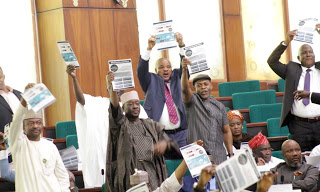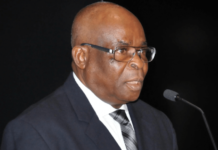“This Bill is in the interest of the youth whom we must empower, because if we empower them, we are empowering the future generation” – Rt. Hon. Yakubu Dogara, on the Not Too Young To Run bill.

“Not too young to run!”
“Not too young to run!”
Chants rent the air in the House of Representatives as Members waved fliers. Any onlooker, oblivious to what was going on, would think that young people in their dozens had somehow managed to infiltrate the chamber and take over proceedings. The date was Thursday, 27th July and the Green Chamber was packed full. It was a special occasion. The highlight of legislative work; for what could be more important than the process of amending the nation’s guiding document, Nigeria’s operating manual, the Constitution?
With bated breath, youth advocates waited. There had been rumours earlier that day that the House was planning to kill the bill which had the potential to finally secure political representation for Nigeria’s teeming youth population. The Senate had already voted in favour of the Bill, and so tensions were high. Were young people’s hopes about to be dashed? Was the political class about to prove notions about deliberately suppressing young people right? Would Speaker Dogara go back on his promise? Was the House going to let us down?
For months, youth and women advocates and Civil Society Organisations lobbied; they paid courtesy visits to principal officers of both chambers of the National Assembly, attended public hearings, approached legislators personally, and executed media campaigns with the aim of gaining public support and building momentum. Although the demographies differed, their mission was the same. All they wanted was to secure political representation for women and young people who, incidentally, make up the bulk of the Nigerian population but are grossly underrepresented in governance. Theyplay active roles at grassroot level during campaigns, yet, are barely able to successfully aspire to political office and appointive positions for a myriad of reasons.
For young people, the Constitution currently places the minimum age for standing for elective office at 30. The exclusion is, therefore, not only due to societal norms which may be combatted via reorientation, but also actively enabled by legal constraints. Many opine that this provision is inherently discriminatory, and anyone with a sense of justice would agree.
For women, the challenges are many. There are cultural and quasi-religious norms which restrict women’s aspirations. These are in addition to systemic inequalities so deeply entrenched that it requires very strong will, an extensive network and enormous resources to break the glass ceiling. Most Nigerian women simply do not have these resourcesand are therefore relegated to wearing aso-ebi, clapping, singing and dancing at campaign grounds in support of the candidacy of their male counterparts who do not have such restrictions to do battle with. Young women face a particularly dire predicament, as theyare further restricted by law.
The Legislature is the arm of government where every Nigerian can lay claim to direct representation. Representatives are elected to both chambers in terms of population and equity, and this is why the House of Representatives is often referred to as “the House of the People”. “The People” include youths and women and in recognition of this, Speaker Yakubu Dogara threw his weight not only behind Nigerian youth’s quest for representation, but also Nigerian women’s demands for equity.
Before the lobbying for inclusion even began, Speaker Dogara had, during a meeting with student leaders from higher institutions across the country, declared his unwavering support for youth inclusion in governance. It therefore came as no surprise that the Not Too Young To Run Bill was granted expeditious consideration by the House when it was eventually presented by Hon. Tony Nwulu.
From meeting with women members of State Assemblies to the courtesy visit by the Not Too Young To Run team, Speaker Dogara demonstrated a deep sense of compassion and justice, listening keenly to everything advocates had to say.
The demands were as follows: young people asked for a reduction in the age of eligibility for elective offices and the introduction of independent candidacy into the nation’s electoral process, in the hope that this will go a long way in circumventing the often torturous political party process. A processwhich many have decried as being needlessly expensive and, ironically, undemocratic. Women asked for affirmative action: a set percentage of ministerial appointments (at federal level) and of commissioners (at state level).
The importance with which the Speaker and the House as a whole considers youth issues was also demonstrated with the speedy response to public outcry following reports that the Not Too Young to Run Bill had been excluded from the report of the Committee on Constitution Review. Speaker Dogara assured Nigerian youths that he had made a promise and that promise would be kept.
Yet, many were doubtful.
This doubt did not last for long as the House voted overwhelmingly in support of independent candidacy, reducing the age of eligibility, and affirmative action for women at both federal and state levels.
The only clause pertaining to political representation which failed to scale through at the House was the one which would confer indigeneship on women, thereby enabling them contest for office where they are married. Although this failed to garner the required number of votes, the Speaker called for a second round of voting, in hopes that more numbers would be gotten and the clause would eventually scale through. Alas! This was not meant to be.
The special consideration given by Speaker Dogara has been commended by many gender advocates, who believe granting a second vote provided further proof of his support for the gender equity campaign, especially as this courtesy was not extended to any other clause.
It is imperative that these efforts be sustained as the fight for inclusion now proceeds to state level. Having won the first round at the National Assembly, youth and women advocates must organise and engage at state level with as much vigour, if not more.
The advocacy must now go to state assemblies and a media strategy which entails crafting messages in support of the aims and objectives should be implemented. Local languages should be used in driving the points home, and public debates need to be held across states in order to generate discussions on youth and women inclusion in governance.
The Dogara-led House of Representatives has fulfilled its promise and now is the time for us all to ensure that these efforts are complemented, so that the Nigerian political space may be truly representative.
[Writer’s note: As an advocate for gender equity and youth representation in politics, and one who fits into both the youth and women demography, it has been an honour to watch my principal make good on his promises and fully support the campaign for youth inclusion and gender equity.]
Rinsola Abiola is SA (New Media) to the Speaker of the House of Representatives, Rt. Hon. Yakubu Dogara; founding PRO of the All Progressives Youth Forum; Ag. President of the APC Young Women Forum, and a Youth Representative on the APC’s Board of Trustees. She writes from Abuja.











